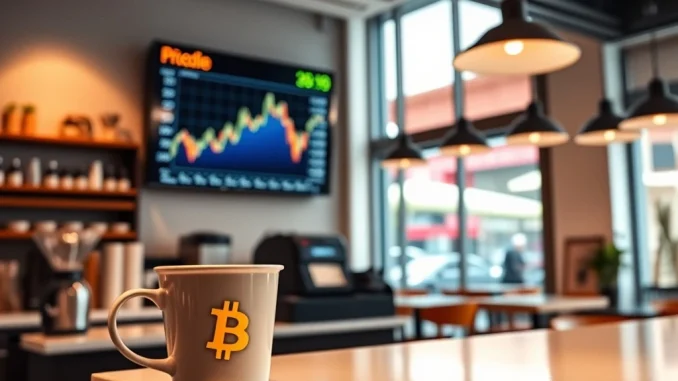
In a move that has captured the attention of financial markets and the cryptocurrency world, Vanadi Coffee, a Spanish coffee chain, has significantly increased its Bitcoin reserves to an impressive 76 BTC, now valued at over $9 million. This strategic decision comes despite the company facing considerable financial challenges, including losses exceeding 3.3 million euros in 2024. This bold pivot underscores a growing trend among publicly listed firms to integrate digital assets into their treasury strategies, seeking alternative avenues for capital preservation and growth. But what exactly does this mean for Vanadi Coffee, and what implications does it hold for the broader landscape of corporate Bitcoin adoption?
Vanadi Coffee’s Audacious Accumulation of Bitcoin Reserves
Vanadi Coffee’s decision to bolster its Bitcoin reserves is a testament to its forward-thinking approach, even as it navigates a turbulent financial period. The latest acquisition saw the company add two more BTC at approximately $119,425 each, bringing their total holdings to 76 BTC. This significant investment, now valued at over $9 million, positions Vanadi Coffee as a trailblazer in Spain, being the first publicly listed company in the nation to embrace cryptocurrency on this scale.
This move is not merely a speculative gamble but a calculated strategic pivot. Despite Bitcoin’s inherent volatility—evidenced by its recent 0.36% price decline over 24 hours, fluctuating between $118,616 and a peak of $120,222—Vanadi Coffee’s portfolio has grown to $9 million. This growth demonstrates a high tolerance for risk, coupled with a belief in Bitcoin’s long-term potential as a hedge against traditional market fluctuations and inflationary pressures.
The company’s public announcement of its Bitcoin treasury plan in June 2024 had an immediate and dramatic effect on its stock price, catalyzing a staggering 242% surge. This surge signals robust investor confidence in Vanadi Coffee’s innovative and future-oriented approach. It suggests that a segment of the market views digital asset integration not as a liability, but as a progressive strategy that could unlock new value and attract a modern investor base.
The Accelerating Trend of Corporate Bitcoin Adoption
Vanadi Coffee’s strategy is not isolated; it reflects a broader global trend of corporate Bitcoin adoption. Influenced by pioneering figures like Michael Saylor of MicroStrategy and the strategic moves of Japanese firms such as Metaplanet, more companies are re-evaluating traditional treasury management in favor of digital assets. These pioneers have demonstrated that allocating a portion of corporate funds to Bitcoin can serve multiple purposes:
- Inflation Hedge: Bitcoin’s fixed supply makes it an attractive asset for hedging against the depreciation of fiat currencies, especially in an era of quantitative easing and rising inflation concerns.
- Alternative Asset Class: It provides diversification away from traditional assets like cash, bonds, and equities, potentially offering uncorrelated returns.
- Long-Term Appreciation Potential: Proponents believe Bitcoin’s scarcity and growing network effect will drive its value higher over time.
- Innovation and Brand Alignment: Embracing Bitcoin can signal a company’s commitment to innovation, attracting tech-savvy talent and a modern customer base.
For Vanadi Coffee, becoming Spain’s first publicly listed company to adopt cryptocurrency at this scale is a significant branding statement. It aligns the coffee chain with financial innovation, potentially attracting a younger, digitally-oriented demographic. This strategic alignment can enhance brand perception and foster a sense of being at the forefront of financial evolution, an increasingly important factor in today’s competitive market.
Navigating the Crypto Treasury Strategy: Risks and Rewards
While the potential rewards of a crypto treasury strategy are compelling, financial analysts note the inherent complexities and risks, especially for a company facing financial strain. Holding a volatile asset like Bitcoin during periods of financial duress could amplify risks, potentially exacerbating existing challenges. Critics highlight the irony of a financially challenged firm investing in an asset associated with high transaction costs and evolving regulatory scrutiny.
However, proponents argue that Bitcoin’s potential for long-term appreciation and its role as an inflation hedge justify its allocation, even in challenging times. The company has not explicitly disclosed whether these reserves will offset liabilities, fund operations, or serve as a purely speculative hedge. This lack of clarity adds a layer of scrutiny to their bold move.
Key considerations for any company implementing a digital asset strategy include:
- Volatility Management: Developing robust risk management frameworks to mitigate the impact of significant price swings.
- Regulatory Compliance: Navigating complex and evolving regulations surrounding digital assets in different jurisdictions. Vanadi Coffee executed its purchase through a third-party custodial service, which helps ensure compliance with local regulations.
- Liquidity Risk: Ensuring sufficient liquidity for operational needs, as significant depreciation in Bitcoin’s value could strain cash flows.
- Accounting and Reporting: Adapting financial reporting to accurately reflect digital asset holdings and their valuation changes.
Vanadi Coffee’s model reflects a broader shift in corporate finance, where digital assets are increasingly viewed as tools for capital preservation and liquidity management. The success of this strategy, however, hinges on the company’s ability to manage Bitcoin’s price swings and regulatory risks without compounding its existing financial pressures. The funding source for these acquisitions remains undisclosed, though analysts speculate operational cash flows or short-term debt may have been utilized.
Digital Asset Investment: A New Frontier for Corporate Finance
The case of Vanadi Coffee highlights the emerging frontier of digital asset investment within corporate finance. It challenges conventional wisdom about treasury management and risk assessment. For years, corporate treasuries primarily focused on preserving capital and ensuring liquidity through low-risk, traditional investments. However, with persistent low interest rates, inflationary pressures, and a desire for higher returns, companies are exploring alternatives.
Vanadi Coffee’s strategy, despite its current financial difficulties, showcases a willingness to innovate and adapt. Their move could serve as a case study for other firms, particularly those in similar financial positions, to explore Bitcoin as an alternative reserve asset. The potential for a struggling company to leverage a volatile asset for a significant stock price surge offers a compelling, albeit risky, narrative.
The broader implications of such moves are profound. If more companies, especially smaller and mid-sized ones, follow suit, it could further legitimize Bitcoin as a mainstream corporate asset. This increased corporate demand could, in turn, contribute to Bitcoin’s long-term stability and value appreciation. However, the path is not without obstacles.
What Does This Mean for Future Corporate Bitcoin Adoption?
Vanadi Coffee’s bold step sets a precedent, particularly in Spain, and contributes to the ongoing global dialogue about the role of digital assets in corporate treasuries. While their approach may encourage other firms to explore Bitcoin as an alternative reserve, the long-term viability of such strategies will depend heavily on market stability and regulatory clarity.
Regulatory uncertainty remains a significant barrier to widespread adoption across many jurisdictions. Governments and financial bodies are still grappling with how to classify, regulate, and tax cryptocurrencies. A clearer, more harmonized regulatory environment would undoubtedly de-risk corporate engagement with digital assets and facilitate broader adoption.
Furthermore, the success of Vanadi Coffee’s strategy will be closely watched. If they can successfully navigate their financial challenges while demonstrating the value of their Bitcoin holdings, it will provide a powerful example for others. Conversely, any significant misstep or adverse market movement could deter future corporate interest. This makes Vanadi Coffee’s journey a critical test case for the evolving corporate treasury landscape, where digital assets are increasingly seen as complements to traditional holdings, not just speculative ventures.
Vanadi Coffee’s decision to increase its Bitcoin reserves to $9 million amidst financial challenges is a powerful statement on the evolving nature of corporate finance. It highlights a growing conviction in Bitcoin’s potential as a strategic asset, despite its volatility and the prevailing regulatory uncertainties. As more companies consider a crypto treasury strategy, Vanadi Coffee’s journey will serve as an important benchmark, illustrating both the audacious potential and the inherent risks of corporate Bitcoin adoption. Their story is a compelling narrative of innovation, risk-taking, and the transformative power of digital asset investment in shaping the future of corporate balance sheets.
Frequently Asked Questions (FAQs)
Q1: Why is Vanadi Coffee increasing its Bitcoin reserves despite financial challenges?
Vanadi Coffee’s decision to increase its Bitcoin reserves, even while facing losses, reflects a strategic pivot towards alternative assets. The company views Bitcoin as a potential hedge against traditional market volatility and inflation, aligning with a global trend of publicly listed firms seeking long-term value appreciation and diversification.
Q2: How much Bitcoin does Vanadi Coffee now hold?
As of recent reports, Vanadi Coffee has increased its Bitcoin (BTC) reserves to 76 BTC, which is valued at over $9 million. The latest purchase involved acquiring two additional BTC at approximately $119,425 each.
Q3: What are the risks associated with a company holding such a volatile asset like Bitcoin?
Holding a volatile asset like Bitcoin carries several risks, including significant price swings that could lead to substantial losses, liquidity strain if the asset’s value drops sharply, high transaction costs, and evolving regulatory scrutiny. For a financially challenged firm, these risks could be amplified.
Q4: Has Vanadi Coffee’s Bitcoin strategy impacted its stock price?
Yes, the public announcement of Vanadi Coffee’s Bitcoin treasury plan in June 2024 catalyzed a remarkable 242% surge in its stock price. This indicates investor confidence in the company’s forward-looking and innovative approach to treasury management.
Q5: Is Vanadi Coffee the first company in Spain to adopt this strategy?
Yes, Vanadi Coffee is positioned as Spain’s first publicly listed company to adopt cryptocurrency at this scale, inspired by global figures and firms like Michael Saylor and Metaplanet who have successfully integrated Bitcoin into their corporate treasuries.
Q6: What are the broader implications of corporate Bitcoin adoption?
The increasing trend of corporate Bitcoin adoption, exemplified by Vanadi Coffee, suggests a significant shift in corporate finance towards digital assets as complements to traditional holdings. It could further legitimize Bitcoin as a mainstream asset, potentially influencing its long-term stability and value, though regulatory clarity remains a key factor for widespread adoption.



